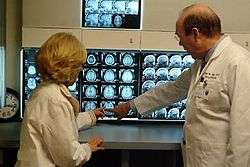Sandra Bond Chapman

Sandra Bond Chapman is a cognitive neuroscientist, founder and chief director of the Center for BrainHealth, Dee Wyly Distinguished Professor in Brain Health,[1] and a professor in the School of Behavioral and Brain Sciences at The University of Texas at Dallas.
Career
Chapman began her career in the 1970s as a speech pathologist, where she often worked with children diagnosed with severe autism. During this time, Chapman encountered several children able to solve complex puzzles despite their hindering diagnosis. This contradiction sparked Chapman's interest in the brain’s potential.[2] Chapman's fascination the brain's modifiability later evolved into the idea of a multidisciplinary center housing brain researchers and therapists working collectively to prevent, arrest, and reverse brain traumas.[3] Only 20 years after it was first conceptualized, Chapman opened the Center for BrainHealth in Dallas, Texas.[4] Chapman continues to serve as the Center for BrainHealth's chief director.
Research
Chapman’s cognitive research has laid the theoretical framework and empirical foundation for the development of measurements of higher order reasoning [Test of Strategic Learning] and the development of brain training programs for children and adults.[5] Her research elucidates novel approaches to maximize cognitive function in people with healthy brains[6] as well as those with brain injury,[7] stroke, ADHD,[8] autism,[9] schizophrenia, substance abuse, and progressive brain diseases like Alzheimer's disease.[10]
Chapman's research has resulted in more than 120 publications,[11] nearly 60 funded research grants, and has served as a national public health road for maintaining cognitive fitness and building critical thinking and reasoning skills in adolescents.[2] Chapman was the principal member writing the first state plan for BrainHealth fitness for adults.[12] Her research record and brain health breakthroughs led to selection of the Center for BrainHealth as the single Virtual Center for the National Pediatric Acquired Brain Injury Plan,[13] which links states with the most current assessment and training for brain injury. She is a core member for NIH’s selection process of central data elements for nationwide clinical trials on acquired brain injury. Throughout her career, Chapman has received major federal, state, and private research support to advance the treatment of veterans, sports-related brain injuries, concussions, autism, schizophrenia, adolescent reasoning, and brain development, among others.
Education
Ph.D. from University of Texas at Dallas
- Doctor of Philosophy in Communication Disorders
- Reference in Aphasia: Processing of Nouns and Pronouns in Narrative Discourse
- May, 1986
M.A. from University of North Texas
- Master of Arts in Communication Disorders
- August, 1974
B.A. from University of North Texas
- Bachelor of Arts Degree in Speech Pathology
- December, 1973
Memberships
Chapman is a member of the following organizations:[14]
- Academy of Aphasia
- Academy of Neurologic Communication Disorders & Sciences
- Alzheimer’s disease and Related Disorders Association, Inc.
- American Association for the Advancement of Science
- American Speech Language and Hearing Association
- American Society of Aging
- American Speech-Language-Hearing Association
- A.W.A.R.E. (The Association of Women for Alzheimer’s Research and Education)
- Charter 100 Member
- Cognitive Neuroscience Society
- Communities Foundation of Texas Designated Fund (CFT) Advisory Committee
- The Dallas Assembly
- Dallas NanoSystems Technical Advisory Board
- Gerontological Society of America
- International Neuropsychological Society
- International Women’s Forum Member
- National Aphasia Association, Regional Representative
- The Sarah Jane Brain Foundation National Advisory Board
- Society for Experimental Biology and Medicine Council
- Society for Neuroscience
- Texas Council for Alzheimer’s, Advisory Board Task Force
- Texas Speech and Hearing Association
References
- ↑ "Timeline 40 Years". The University of Texas at Dallas. Retrieved 2010-07-23.
- 1 2 Mind Matters: Brain Trust. D Magazine, Dawn McMullen.2010-05.
- ↑ "Center for BrainHealth Facilities". The University of Texas at Dallas. Retrieved 2010-07-23.
- ↑ Robert Miller.The Dallas Morning News: BrainHealth Takes Pleasure in New Center. Knight Ridder Tribune Business News.2007-01-21
- ↑ "Sandra Bond Chapman". The University of Texas at Dallas. School of Behavioral and Brain Sciences. Retrieved 2010-07-27.
- ↑ "Putting Minds to the Test". Dallas Morning News. Retrieved 2010-07-27.
- ↑ Chapman SB; Gamino JF; Cook LG; Levin HS. "Impaired discourse gist and working memory after brain injury". Brain and Language.2006.
- ↑ "UT Dallas researchers hope to train teens in reasoning skills". The Dallas Morning News. 2008-09-08. Retrieved 2010-07-23.
- ↑ "Can Second Life Therapy help with Autism?". American Psychological Association. Retrieved 2010-07-27.
- ↑ Jeanie Lerch Davis. "Mental Exercises Slow Alzheimer's Disease". Webmd. Retrieved 2010-07-27.
- ↑ "Publications". Center for BrainHealth. Retrieved 2010-07-27.
- ↑ Mary Ann Roser. "State unveiling first plan for Alzheimer's 'epidemic,' seeking public comment". Statesman. Retrieved 2010-07-27.
- ↑ "The National Acquired Brain Injury Plan" (PDF). Archived from the original (PDF) on July 30, 2009. Retrieved 2010-07-27.
- ↑ "Sandra Chapman CV" (PDF). The Brain Project. Retrieved 2010-07-27.